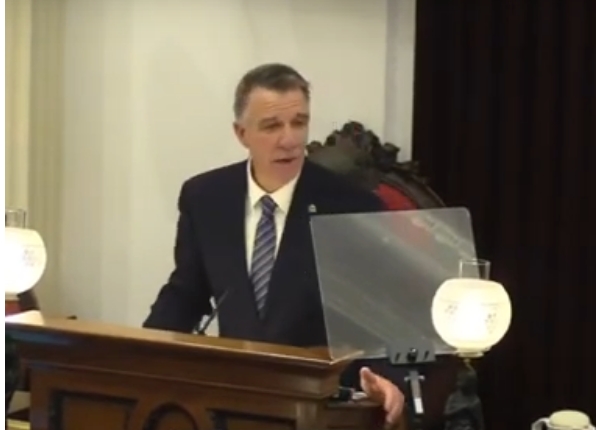Governor Phil Scott's Inaugural Speech Echoes Vermont Chamber’s Priorities

Governor Phil Scott’s inaugural address delivered a clear call to action on the most pressing challenges, including affordability, housing, education reform, and workforce sustainability. These priorities reflect significant overlap with the Vermont Chamber of Commerce’s ongoing advocacy efforts, emphasizing shared goals to strengthen Vermont’s economy and improve the quality of life for its residents. Keeping affordability and Vermont’s challenging demographics at the forefront, the address focused on:
- Affordability and economic growth
- Addressing the housing crisis
- Student-centered education reforms
- Moving forward together
Affordability and Economic Growth
A central theme of Governor Scott’s speech was Vermont’s need to tackle its affordability crisis. He noted the state’s reputation as a high-tax destination and emphasized that Vermont cannot afford to lose more residents due to rising costs. A vision of achieving affordability through economic growth rather than tax increases aligns with the Vermont Chamber’s emphasis on fostering business resilience and attracting new residents. Both aim to reduce the financial burdens facing Vermont’s families and businesses while expanding economic opportunities.
The Governor’s message of bolstering opportunities for working Vermonters and supporting local communities parallels the Chamber’s push for innovative workforce development solutions. Efforts to promote Vermont as a destination for skilled workers and investing in community development directly impact the other challenges facing Vermont. The economic impact of a shrinking workforce remains a key focus for the Vermont Futures Project, which continues to highlight the issue and provide valuable data to support solutions.
Housing: A Shared Priority
The Vermont Chamber has long advocated for increased housing supply by addressing root causes and barriers to development. Governor Scott echoed this urgent need, calling for the construction of 8,000 new homes annually—a figure Vermont is far from achieving. The speech advocated for treating housing development as an emergency by streamlining regulatory barriers, investing in infrastructure, and revitalizing workforce. Affordable housing for all incomes is critical to retaining employees, attracting new talent, and fostering economic growth.
Education: Tackling Costs and Improving Outcomes for Students
The Governor delivered a pointed critique of Vermont’s current education funding model, highlighting dramatic cost increases that outpace the value delivered. With the current expected 5.9% increase this year, property taxes will have increased by 33% over three years, a trend further compounded by increases in education-related revenue sources, many of which depend on taxes collected and remitted by the business community. These include 100% of sales tax revenue, one-third of purchase and use tax revenue, one-quarter of rooms and meals tax revenue, 100% of the new short-term rental surcharge, as well as lottery funds and general fund transfers. Despite these escalating costs, Vermont serves only 80,300 students across an “out of scale” education system with high administrative overhead and small class sizes.
Scott pledged to introduce a multi-year plan to overhaul the system focusing on a student-centered funding formula and a more efficient governance structure. This proposal includes streamlining administrative costs, rethinking local school board responsibilities, and implementing guardrails to ensure fiscal discipline. By addressing these systemic inefficiencies, the Governor aims to contain costs while improving outcomes—both of which are essential to Vermont’s economic future.
This approach complements the Vermont Chamber’s advocacy for critical cost-saving reforms that prioritize addressing root issues over simply increasing funding.
Moving Forward Together
Governor Scott’s speech reflected a shared vision with the Vermont Chamber: focusing on practical, long-term solutions to Vermont’s most significant challenges. From housing to affordability to workforce development, his priorities align with the Chamber’s commitment to advancing Vermont’s economy.
As the legislative session progresses, the Vermont Chamber will collaborate with lawmakers, the administration, and other stakeholders to achieve shared goals. The Governor, Speaker, and Pro Tem have all emphasized the importance of setting priorities, maintaining focus, and taking a collaborative approach. The Vermont Chamber will look for this commitment every day throughout the session, and expect all leadership to continue driving progress, delivering outcomes, and advocating for policies that support Vermont’s businesses and communities.
